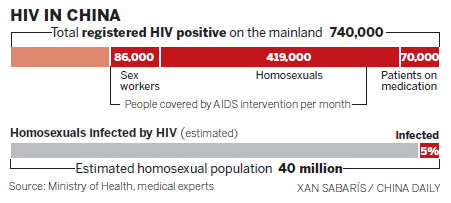Government and Policy
Campaign to target HIV/AIDS risk groups
By Shan Juan (China Daily)
Updated: 2010-11-30 07:34
 |
Large Medium Small |
90% to be included in intervention as 44,000 infections reported this year
|
 Hao Yang is deputy director of the disease prevention and control bureau of the Ministry of Health. |
BEIJING - An intervention program will be expanded to include at least 90 percent of groups considered at high risk of contracting HIV/AIDS by 2015, in a move to reverse the spread of the virus, a leading health official said.
| ||||
"The disease is striking these groups particularly hard with infections rising sharply, though the government has checked the trend of fast-rising HIV infections," he said ahead of World AIDS Day, which falls on Wednesday.
By the end of October, China detected roughly 44,000 new HIV infections this year, with nearly 13 percent infected through gay sex, the latest ministry statistics showed.
Reported AIDS-related deaths reached 68,000, up nearly 20,000 year-on-year.
The latest intervention target is set in China's next Five-Year Action Plan to Control HIV/AIDS (2011-2015), which is still under discussion, Hao said.
Hao also urged an end to discrimination to help the fight against HIV/AIDS.
Those infected with HIV/AIDS are often looked down upon by society, and in the case of sex workers and drug users, criminalized. As a result, many are reluctant or scared to accept services from the government, according to Mark Stirling, the United Nations Country Coordinator on AIDS in Beijing.
The State Council, China's Cabinet, pledged on Monday to step up screening for HIV/AIDS, while enhancing public knowledge of the disease, to protect those at risk of infection.
The government will expand its monitoring network to detect as many HIV-positive people as possible, according to a statement issued after a State Council executive meeting.
The government will promote the application of fast HIV-infection detection methods at the grassroots level, the statement said, without elaborating.
To curb mother-to-child transmission, the government will continue to provide free tests for HIV/AIDS and syphilis for expectant mothers, it said.
To control its spread among drug addicts, the government will build a comprehensive intervention network comprised of forced rehabilitation, community correction, and medical treatment. Campaigns against drug trafficking and prostitution will be boosted, the statement said.
The government will also add more HIV/AIDS medicines to basic medical insurance to ease the financial burden of those infected while boosting the use of traditional Chinese medicine in treatment, it said.
Hao noted that government funding for tackling AIDS has quadrupled since 2003 and is expected to reach 1.6 billion yuan ($240 million) for 2010.
Each month, hundreds of thousands of homosexual men and sex workers on the mainland are instructed on safe-sex through various government-backed AIDS intervention projects, official statistics show.
But, compared with an estimated homosexual population on the mainland of nearly 40 million, "that's far from enough", Hao noted.
The World Health Organization estimates that about 60 percent of vulnerable groups need to be subject to intervention to prevent HIV/AIDS from spreading.
Also, largely due to discrimination, more than 80 percent of homosexual men choose to marry women, which also puts their wives at risk of contracting the virus, according to a study involving more than 8,000 homosexuals led by professor Zhang Beichuan at Qingdao University.
The study also found that at least 70 percent of the homosexual population had more than one sexual partner, but only 30 percent used condoms.
"Consequently, HIV/AIDS has been rampant among the MSM group and the average HIV prevalence among them is 5 percent nationwide," Hao said, adding the rate is 0.05 percent among the general public. In some cities, nearly one out of five homosexuals are infected.
Notably, 71 percent of vulnerable groups covered by intervention would use condoms, Hao said.
He noted that it was important for other departments, like public security, to join the campaign, especially in dealing with sex workers.
Intervention, including the promotion of condom use, should never be halted among sex workers, he said, adding that increasing awareness is required for an inter-department partnership to combat AIDS.
He also conceded that the ongoing crackdown on prostitution posed a challenge for intervention.
Currently, AIDS prevalence among sex workers stands roughly at 2 percent nationwide, experts said.

Xinhua contributed to this story.



